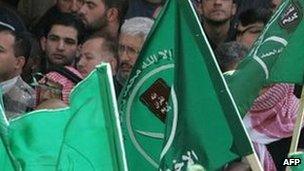Jordan's Muslim Brotherhood to boycott early elections
- Published

Jordan's Muslim Brotherhood has said its political party, the Islamic Action Front, will boycott early parliamentary elections due by the end of the year.
The Islamists said recent changes to the election law did not go far enough, and warned of further public protests.
But they said they might reverse the decision if there were serious reforms.
A boycott would be a blow for King Abdullah, who has promised reform in the hope of avoiding anti-government unrest in the wake of the Arab Spring.
Two-ballot row
The Brotherhood said the decision for the Islamic Action Front (IAF) to boycott the elections was approved by the organisation's advisory council.
"The regime has failed to meet reform demands by Jordanians, including the Islamist movement," the Brotherhood's deputy leader, Zaki Bani Rusheid, told the AFP news agency.
The main dispute is over the new electoral law, which allows each voter two separate ballots: one for representatives from local districts and one for candidates competing under a proportional representation at the national level.
But the Brotherhood - and other opposition movements - says an increase of seats allocated for party candidates in the 140-strong lower house of parliament - from 17 to 27 - is not enough.
The Brotherhood is reportedly pressing for at least 30% of the seats in the House of Representatives to be contested under proportional representation.
It argues that the local district system favours tribal candidates.
The IAF boycotted the last elections in 2010, saying it was marginalised at the expense of supporters of King Abdullah.
Correspondents say the Brotherhood's latest move is likely to pile more pressure on King Abdullah, as his promised political and economic reforms appear to be stalling.
While demonstrations have been generally smaller and more peaceful than elsewhere in the region, Jordanians have been pressing for a greater say in how their country is run, and demanding corruption and unemployment be tackled.
- Published9 May 2012
- Published26 April 2012
- Published4 November 2011
- Published24 October 2011
- Published17 October 2011
- Published19 April 2023